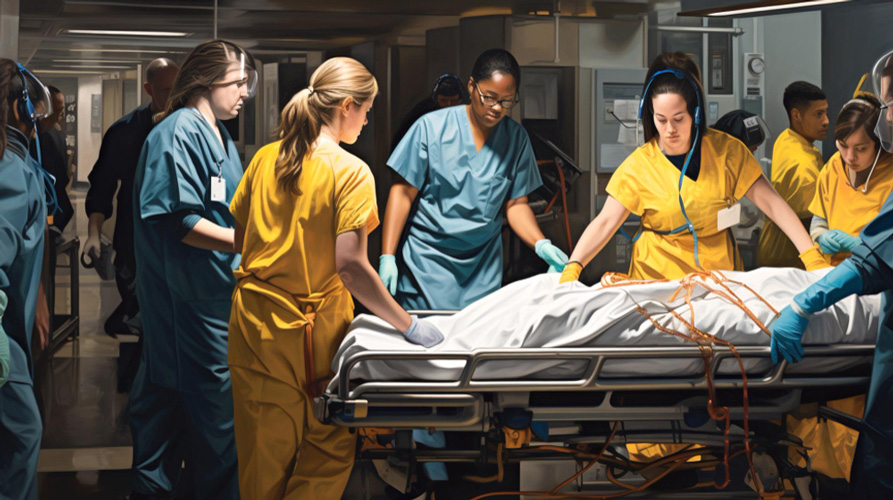Mastering Critical Care Nursing: A Comprehensive Guide
Introduction to Critical Care Nursing
Critical care nursing is a highly specialized field within the nursing profession that focuses on providing care to patients who are experiencing life-threatening health conditions. These nurses work in intensive care units (ICUs), trauma centers, and emergency departments, where they care for patients with complex and severe health problems. The role of a critical care nurse is both challenging and rewarding, requiring advanced skills, deep knowledge, and the ability to make quick decisions under pressure.
The Role of a Critical Care Nurse
Critical care nurses are responsible for monitoring and treating patients who are critically ill or injured. Their duties include:
- Monitoring Vital Signs: Continuous monitoring of heart rate, blood pressure, oxygen levels, and other vital signs to detect any changes in the patient's condition.
- Administering Medications and Treatments: Providing precise medication dosages, intravenous fluids, and other treatments as prescribed by physicians.
- Supporting Life-Sustaining Equipment: Managing ventilators, dialysis machines, and other life-support systems.
- Patient Advocacy: Acting as an advocate for the patient, ensuring that they receive the best possible care and that their needs and wishes are respected.
- Collaboration with Healthcare Team: Working closely with physicians, respiratory therapists, physical therapists, and other healthcare professionals to develop and implement comprehensive care plans.
- Providing Emotional Support: Offering emotional and psychological support to patients and their families during extremely stressful times.
Essential Skills for Critical Care Nursing
Critical care nursing demands a unique set of skills that go beyond the typical nursing skill set. Some of the key skills include:
-
Advanced Clinical Knowledge:
A deep understanding of pathophysiology, pharmacology, and medical procedures is essential. Critical care nurses must be familiar with a wide range of medical conditions and their treatments. -
Technical Proficiency:
Proficiency in operating and troubleshooting advanced medical equipment, such as ventilators, ECG monitors, and infusion pumps, is crucial. -
Critical Thinking and Decision-Making:
The ability to think quickly, analyze complex information, and make sound decisions in high-pressure situations is vital in critical care settings. -
Communication Skills:
Effective communication with the healthcare team, patients, and families is essential. Nurses must convey information clearly and compassionately, especially when discussing sensitive topics. -
Emotional Resilience:
Working in critical care can be emotionally taxing. Nurses must have the resilience to cope with the stress of caring for seriously ill patients and dealing with outcomes that may not always be positive.
Educational Pathways and Certification
To become a critical care nurse, one must first be a registered nurse (RN), typically with a Bachelor of Science in Nursing (B.Sc. Nursing). After gaining experience in general nursing, many pursue specialized training in critical care.
-
Critical Care Nursing Courses:
Specialized training programs, often provided by hospitals or nursing schools, offer courses that focus on critical care topics such as advanced life support, trauma nursing, and intensive care management. -
Certification:
Obtaining certification as a critical care nurse is a valuable credential. In India, nurses can pursue certifications such as the Critical Care Nursing Specialty Certification (CCNS) offered by the Indian Nursing Council (INC) or international certifications like the CCRN (Critical Care Registered Nurse) offered by the American Association of Critical-Care Nurses (AACN). -
Continuous Education:
The field of critical care is constantly evolving. Nurses must engage in continuous education through workshops, seminars, and online courses to stay updated on the latest practices and technologies.
Challenges and Rewards of Critical Care Nursing
Critical care nursing is not without its challenges. The intensity of the work, the emotional burden of caring for critically ill patients, and the need for constant vigilance can lead to stress and burnout. However, the rewards of this profession are immense.
-
Making a Difference:
Critical care nurses play a pivotal role in saving lives and improving patient outcomes. The impact they have on their patients and their families is profound and deeply fulfilling. -
Professional Growth:
The skills and knowledge gained in critical care nursing open doors to various advanced career opportunities, such as nurse practitioner roles, leadership positions in healthcare, or specialization in areas like trauma or cardiac care. -
Team Collaboration:
Working closely with a team of dedicated healthcare professionals fosters a strong sense of camaraderie and shared purpose.
Future Trends in Critical Care Nursing
The field of critical care nursing is continually advancing, with new technologies and methodologies emerging. Some of the future trends include:
-
Tele-ICU and Remote Monitoring:
The integration of telemedicine into critical care allows for remote monitoring of patients by specialists, improving access to expert care in underserved areas. -
Artificial Intelligence and Data Analytics:
AI and data analytics are increasingly being used to predict patient outcomes, optimize treatment plans, and enhance the precision of care in critical settings. -
Personalized Medicine:
The shift towards personalized medicine, where treatments are tailored to individual patient profiles, is gaining momentum in critical care, leading to more effective and targeted interventions. -
Enhanced Focus on Mental Health:
Recognizing the psychological toll of critical illness, there is a growing emphasis on integrating mental health support into critical care, both for patients and healthcare providers.
Conclusion
Critical care nursing is a demanding yet incredibly rewarding profession that plays a crucial role in the healthcare system. As the field continues to evolve, critical care nurses will remain at the forefront of life-saving interventions and compassionate care. For those who are passionate about making a significant impact in the lives of critically ill patients, a career in critical care nursing offers unparalleled opportunities for growth, learning, and personal fulfillment.


